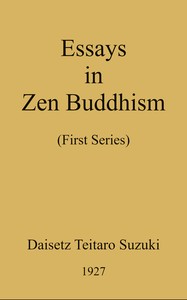| Author |
Suzuki, Daisetz Teitaro, 1870-1966 |
| Title |
Essays in Zen Buddhism : First series
|
| Original Publication |
United Kingdom: Luzac and Company, 1927.
|
| Note |
Reading ease score: 66.5 (8th & 9th grade). Neither easy nor difficult to read.
|
| Contents |
Introduction -- Zen as the Chinese interpretation of the doctrine of enlightenment -- Enlightenment and ignorance -- History of Zen Buddhism in China, from Bodhi-dharma to the sixth patriarch (Hui-nêng) -- Satori -- Practical methods of Zen instruction -- The meditation hall and the ideals of Zen life -- The ten cow-herding pictures -- Appendix: Chinese notes.
|
| Credits |
Anonymous
|
| Summary |
"Essays in Zen Buddhism: First Series" by Daisetz Teitaro Suzuki is a collection of philosophical essays written in the early 20th century. The work serves as an exploration of Zen Buddhism, focusing on its development, principles, and practices while making it accessible to a Western audience. It covers key concepts such as enlightenment, meditation, and the relationship between Zen and traditional Buddhist teachings. The opening of the book provides a preface where Suzuki discusses the fundamental nature of Zen, describing it as an art of understanding one's own being and a means to achieve freedom from suffering. He emphasizes that Zen transcends intellectual reasoning and instead relies on direct personal experience to grasp its truths. Suzuki acknowledges the challenges of studying Zen, both from a scholarly and a practical perspective, while expressing his hope that his insights may help illuminate Zen's significance and relevance in modern life. This introduction effectively sets the stage for a deeper exploration of Zen in the subsequent essays. (This is an automatically generated summary.)
|
| Language |
English |
| LoC Class |
BQ: Philosophy, Psychology, Religion: Buddhism
|
| Subject |
Zen Buddhism
|
| Category |
Text |
| EBook-No. |
71157 |
| Release Date |
Jul 10, 2023 |
| Copyright Status |
Public domain in the USA. |
| Downloads |
370 downloads in the last 30 days. |
|
Project Gutenberg eBooks are always free!
|

